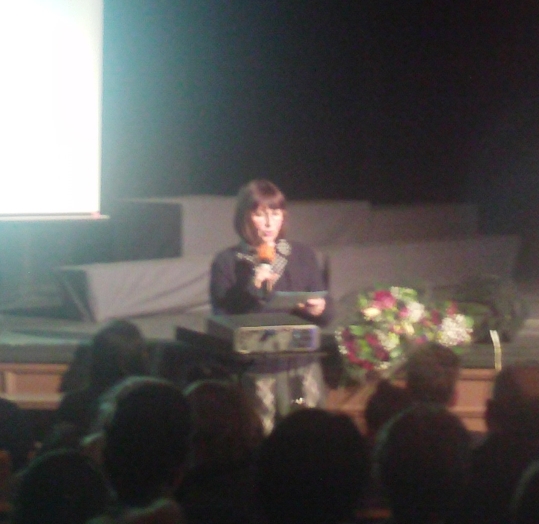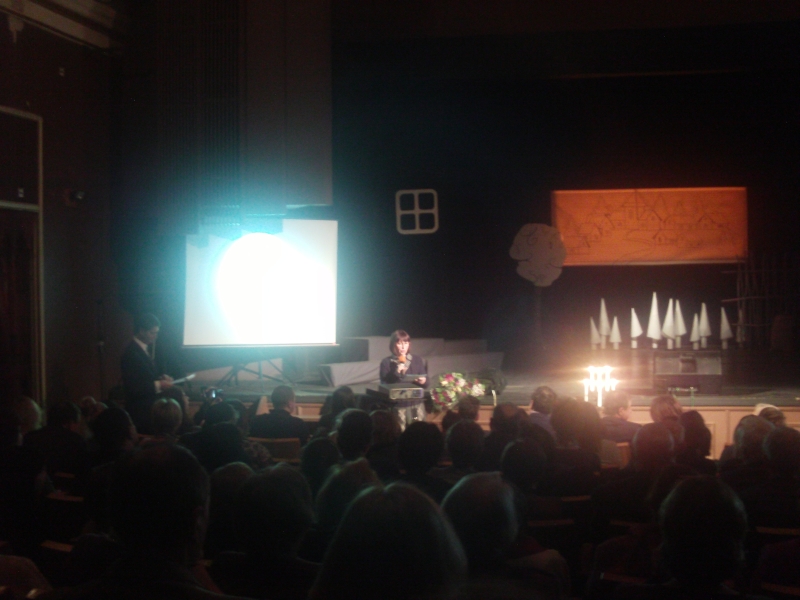The Saulėtekis School in Vilnius devoted to education in the Russian language staged what school principal Reiza Zinkevičienė described as a “theatrical concert” at the Lelė Theater in the Vilnius Old Town on the evening of February 4.
The concert was also performed at the school two days earlier, and was conceived as part of on-going Holocaust education programs at the school. Principal Zinkevičienė, who is Jewish herself, said the event was organized together with Lithuania’s International Commission for the Evaluation of the Crimes of the Nazi and Soviet Occupation Regimes in Lithuania, which has been working in cooperation with Israel’s commemorative authority Yad Vashem to train teachers from Lithuania on how best to organize and teach the Holocaust. She said several of her teachers had been to Yad Vashem for the two-week courses, and that for them, for her and for their school, this was a spiritual mission more than merely an educational matter.
“If other schools in Lithuania taught about the Holocaust the way we do, there wouldn’t be any need to talk about the need for inculcating civic-mindedness or the best way to teach citizenship at school,” she told a Lithuanian Jewish Community representative before the concert.
Scheduled to start at 6 P.M., the audience began showing up en masse around 5:30 and soon there were almost no seats left in the rather large performance space. A row marked “Guests” with a marker on an A4 sheet of white paper became the loose anchor around which an ad hoc collection of ambassadors and their entourages arrayed themselves towards the back of the lofty theater. Officials from the Russian and Austrian as well as a number of other embassies showed up for the concert. Newly-appointed Israeli ambassador Amir Maimon, who had earlier that day presented his credentials to the Lithuanian head of state and was now technically the first Israeli ambassador to Lithuania ever (the former arrangement being an ambassador to both Latvia and Lithuania, residing in Riga), showed up with his wife, without greater fanfare, and made his way to “embassy row,” but was quickly apprehended by Rolandas Račinskas, the executive secretary of the International Commission, and steered to the front and center. He also seized Fania Brancovskaja, the WWII Jewish partisan veteran, and put her next to the ambassador.
There was a considerable delay before the event formally began, and then there was a long speech by Račinskas with a semi-synchronous translation to English, during which children in the audience began nodding off and audience members began audibly complaining. Račinskas’s long statement was followed by a mercifully brief one by Emanuelis Zingeris, who did his own translating and basically welcomed everyone and noted the historic significance of the first Israeli ambassador to free Lithuania attending the event in what was the Vilna ghetto theater building. Israel’s ambassador also spoke briefly, saying Josef Melamed of the Association of Lithuanian Jews in Israel had told him he must meet Fania Brancovskaja, and that he was happy he now had that opportunity. School principal Reiza Zinkevičienė also spoke briefly on what it meant to her to teach students about the Holocaust, and made favorable pronouncements on the work of the International Commission. All of the aforementioned plus some children each lit one candle of six to symbolize and commemorate the six million murdered during the Holocaust. The candles burned throughout the event right in front of the stage.
When the concert was finally underway, a number of students, boys and girls ranging from perhaps 6 to 17 years of age, performed a whole series of songs in Russian, Hebrew, Yiddish and Lithuanian. While the repertoire and set-up was reminiscent of earlier performances at the same venue by students from Vilnius’s Jewish school, the Sholem Aliechem primary and secondary school, what the Russians students lacked in originality they made up for in spades in scintillating enthusiasm for the foreign-language–especially Hebrew–material. It wasn’t a completely air-tight performance–different children had different levels of skill in song and dance and the choreography wasn’t always simultaneous–but the children seemed genuinely interested and inspired, which infected the audience. Some of the acts were as good as anything you’d likely see among professional young female crooners such as Ariana Grande’s recent forays into pop song, if not better, in terms of poise, delivery and voice. Others were relaxed and almost casual. One of the more authentic sets was the one called The Rabbi’s Song with children complementing the performance by former school teacher Vladimir Sherman in good Yiddish. During their rendition of Yerushalayim Shel Zahav the children slipped in a line in Lithuanian near the end of the song, to the effect that there was an eternal link between the Jewish city and the Jerusalem of the North, i.e., Vilnius. The children also performed the Israeli national anthem to the literally standing-room audience.
After what had turned into an epic-length concert/musical of real enthusiasm and budding talent, suddenly everything went wrong. The children were just settling down into what seemed almost like a cross between MTV Unplugged and Russian folk songs around the campfire, a line of young people sitting cross-legged strumming acoustic guitars, when everything went dark and a terrible roar rent the stage. Techno strobe lights erupted to reveal two men in black–black plastic garbage bags it seemed–standing with their backs turned to the audience. In front of them danced human victims before images of barbed wire and concentration camps. Nobody expected the Holocaust here, at this point in the performance, just as no one expected it in real life.
After way too much Holocaust set to the theme from Rocky (or something like it, but thankfully not The Exorcist), things ended on an optimistic note of song, transitioning from “I Could Have Done More” from Schindler’s List to Hatikva and Yerushalayim with small Lithuanian inclusions. At one point a crowd of children on stage each held in either hand a Lithuanian and an Israel flag, waved alternately and then together. After brief thanks to the ambassadors, performers and audience for turning out, the show was over.
Speaking after the concert, world-renowned Yiddishist Dovid Katz said the Russian school children had really given Sholem Aleichem a run for their money, but wondered why no real Litvak songs were included, the program being mostly made of generic Jewish songs such as Hava Nagila and so on. He said the Sholem Aleichem concert at the same venue about one year ago also failed to feature even one authentic Litvak item. In truth the Russian school’s concert was slightly more Hassidic-themed than the Sholem Aleichem performance, which was also weighted more towards Hassidism than traditional Vilna Litvak themes.




